English for Oral Communication: Parental Control Over Teens
VerifiedAdded on 2020/11/23
|11
|3239
|260
Essay
AI Summary
This essay delves into the contentious issue of parental control over children who have reached the age of sixteen and above. It begins by establishing the context of persuasive speech and its role in addressing societal issues. The main body of the essay critically evaluates the arguments for and against parental control, acknowledging that parents often struggle to provide for their children and want to protect them from harm. However, the essay also explores the potential downsides of excessive control, such as hindering cognitive abilities and fostering negative emotions. The analysis extends to the impact of digital technologies and the importance of communication between parents and children. The essay concludes by emphasizing the need for adaptability, balance, and the development of trust to promote healthy family relationships and the well-being of teenagers. This essay examines the complexities of parental control, highlighting the need for a nuanced approach that considers the evolving needs of both parents and children.
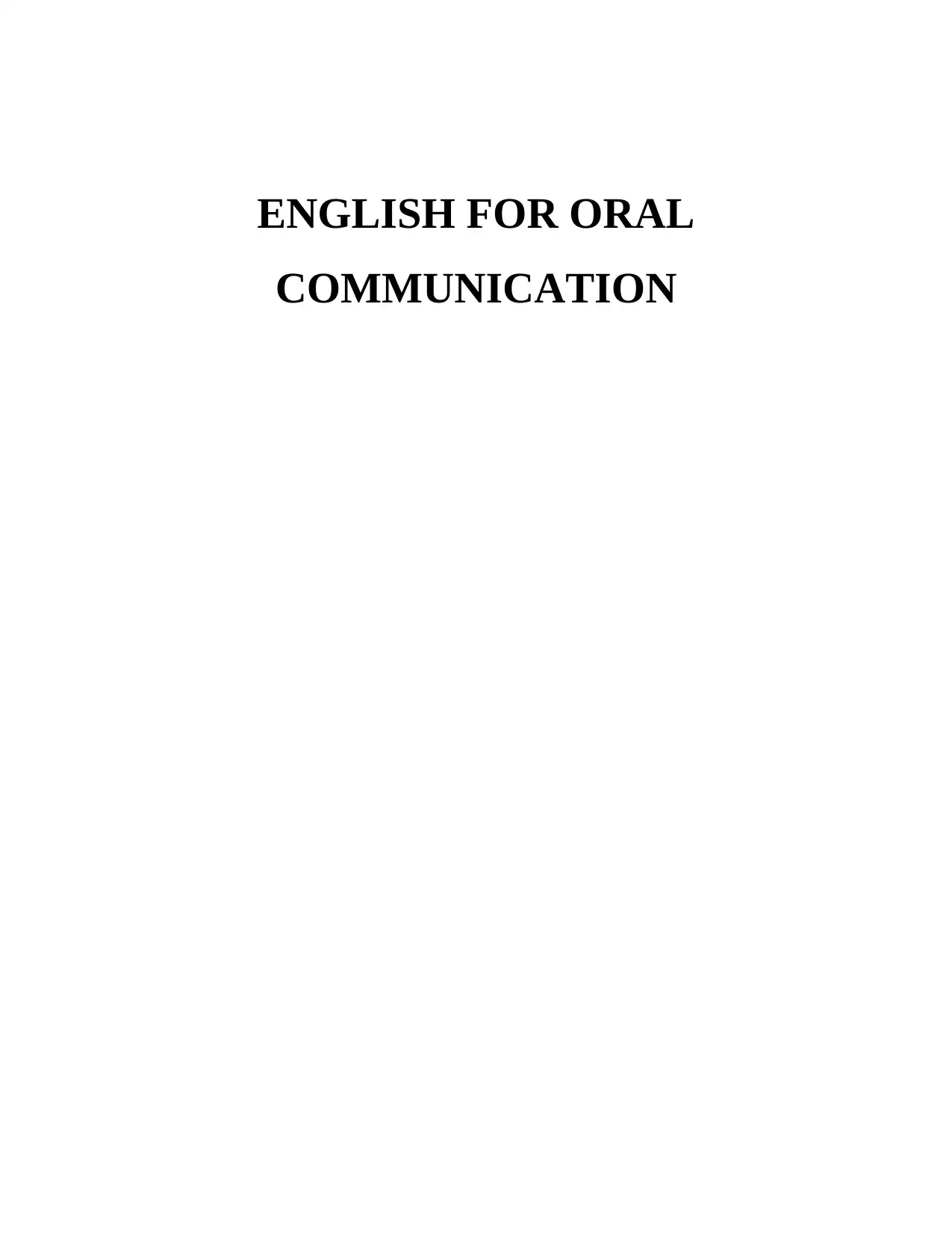
ENGLISH FOR ORAL
COMMUNICATION
COMMUNICATION
Paraphrase This Document
Need a fresh take? Get an instant paraphrase of this document with our AI Paraphraser
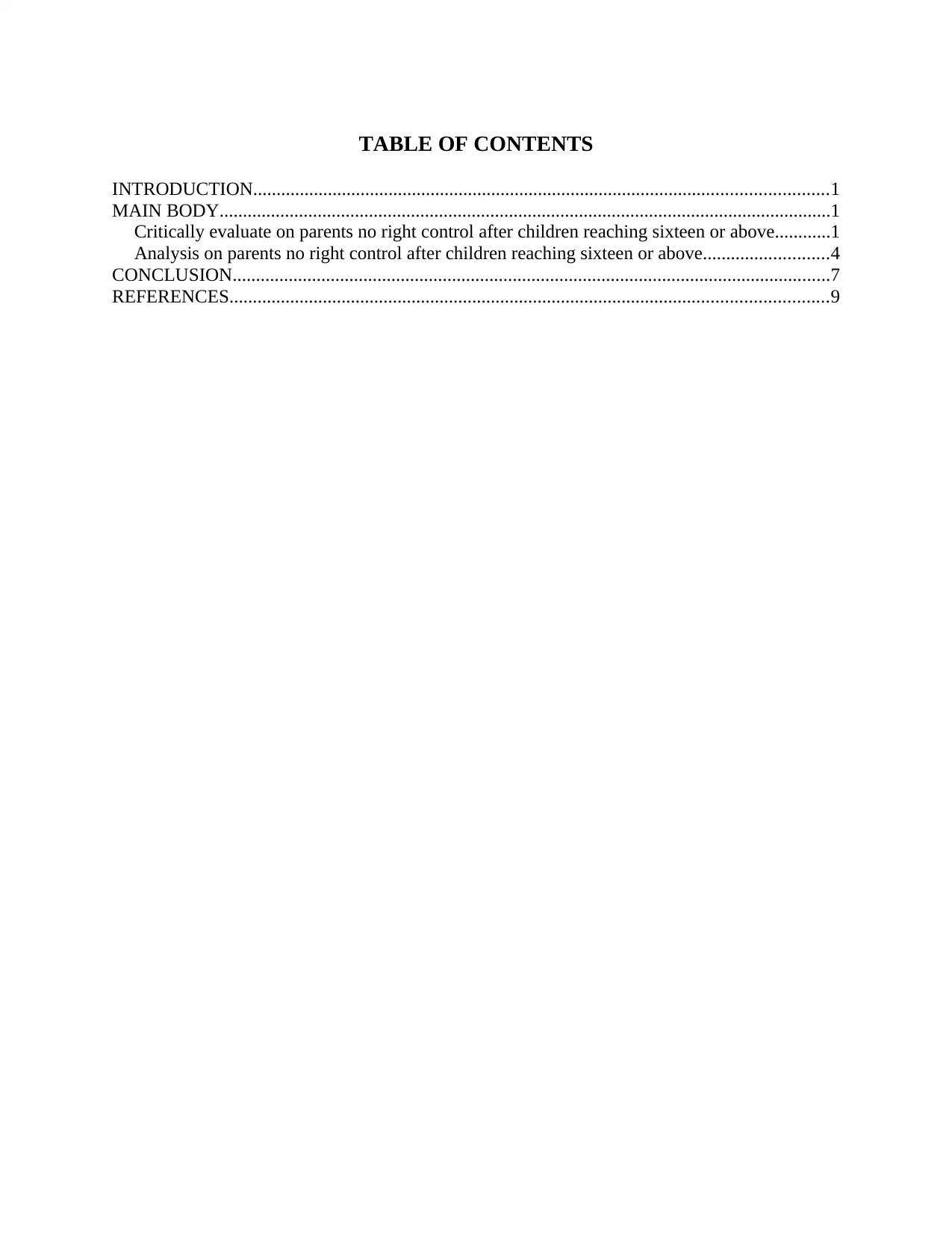
TABLE OF CONTENTS
INTRODUCTION...........................................................................................................................1
MAIN BODY...................................................................................................................................1
Critically evaluate on parents no right control after children reaching sixteen or above............1
Analysis on parents no right control after children reaching sixteen or above...........................4
CONCLUSION................................................................................................................................7
REFERENCES................................................................................................................................9
INTRODUCTION...........................................................................................................................1
MAIN BODY...................................................................................................................................1
Critically evaluate on parents no right control after children reaching sixteen or above............1
Analysis on parents no right control after children reaching sixteen or above...........................4
CONCLUSION................................................................................................................................7
REFERENCES................................................................................................................................9
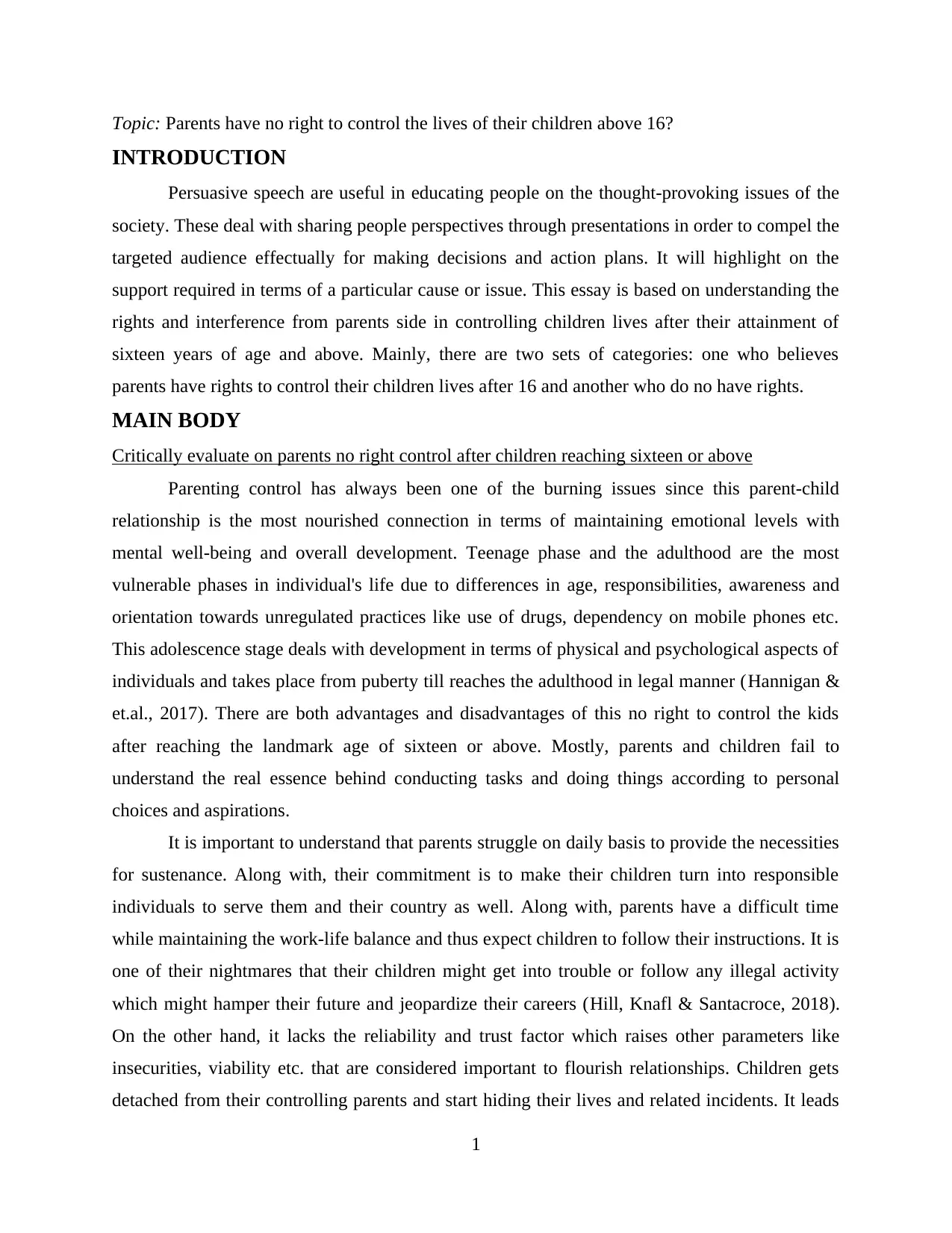
Topic: Parents have no right to control the lives of their children above 16?
INTRODUCTION
Persuasive speech are useful in educating people on the thought-provoking issues of the
society. These deal with sharing people perspectives through presentations in order to compel the
targeted audience effectually for making decisions and action plans. It will highlight on the
support required in terms of a particular cause or issue. This essay is based on understanding the
rights and interference from parents side in controlling children lives after their attainment of
sixteen years of age and above. Mainly, there are two sets of categories: one who believes
parents have rights to control their children lives after 16 and another who do no have rights.
MAIN BODY
Critically evaluate on parents no right control after children reaching sixteen or above
Parenting control has always been one of the burning issues since this parent-child
relationship is the most nourished connection in terms of maintaining emotional levels with
mental well-being and overall development. Teenage phase and the adulthood are the most
vulnerable phases in individual's life due to differences in age, responsibilities, awareness and
orientation towards unregulated practices like use of drugs, dependency on mobile phones etc.
This adolescence stage deals with development in terms of physical and psychological aspects of
individuals and takes place from puberty till reaches the adulthood in legal manner (Hannigan &
et.al., 2017). There are both advantages and disadvantages of this no right to control the kids
after reaching the landmark age of sixteen or above. Mostly, parents and children fail to
understand the real essence behind conducting tasks and doing things according to personal
choices and aspirations.
It is important to understand that parents struggle on daily basis to provide the necessities
for sustenance. Along with, their commitment is to make their children turn into responsible
individuals to serve them and their country as well. Along with, parents have a difficult time
while maintaining the work-life balance and thus expect children to follow their instructions. It is
one of their nightmares that their children might get into trouble or follow any illegal activity
which might hamper their future and jeopardize their careers (Hill, Knafl & Santacroce, 2018).
On the other hand, it lacks the reliability and trust factor which raises other parameters like
insecurities, viability etc. that are considered important to flourish relationships. Children gets
detached from their controlling parents and start hiding their lives and related incidents. It leads
1
INTRODUCTION
Persuasive speech are useful in educating people on the thought-provoking issues of the
society. These deal with sharing people perspectives through presentations in order to compel the
targeted audience effectually for making decisions and action plans. It will highlight on the
support required in terms of a particular cause or issue. This essay is based on understanding the
rights and interference from parents side in controlling children lives after their attainment of
sixteen years of age and above. Mainly, there are two sets of categories: one who believes
parents have rights to control their children lives after 16 and another who do no have rights.
MAIN BODY
Critically evaluate on parents no right control after children reaching sixteen or above
Parenting control has always been one of the burning issues since this parent-child
relationship is the most nourished connection in terms of maintaining emotional levels with
mental well-being and overall development. Teenage phase and the adulthood are the most
vulnerable phases in individual's life due to differences in age, responsibilities, awareness and
orientation towards unregulated practices like use of drugs, dependency on mobile phones etc.
This adolescence stage deals with development in terms of physical and psychological aspects of
individuals and takes place from puberty till reaches the adulthood in legal manner (Hannigan &
et.al., 2017). There are both advantages and disadvantages of this no right to control the kids
after reaching the landmark age of sixteen or above. Mostly, parents and children fail to
understand the real essence behind conducting tasks and doing things according to personal
choices and aspirations.
It is important to understand that parents struggle on daily basis to provide the necessities
for sustenance. Along with, their commitment is to make their children turn into responsible
individuals to serve them and their country as well. Along with, parents have a difficult time
while maintaining the work-life balance and thus expect children to follow their instructions. It is
one of their nightmares that their children might get into trouble or follow any illegal activity
which might hamper their future and jeopardize their careers (Hill, Knafl & Santacroce, 2018).
On the other hand, it lacks the reliability and trust factor which raises other parameters like
insecurities, viability etc. that are considered important to flourish relationships. Children gets
detached from their controlling parents and start hiding their lives and related incidents. It leads
1
⊘ This is a preview!⊘
Do you want full access?
Subscribe today to unlock all pages.

Trusted by 1+ million students worldwide
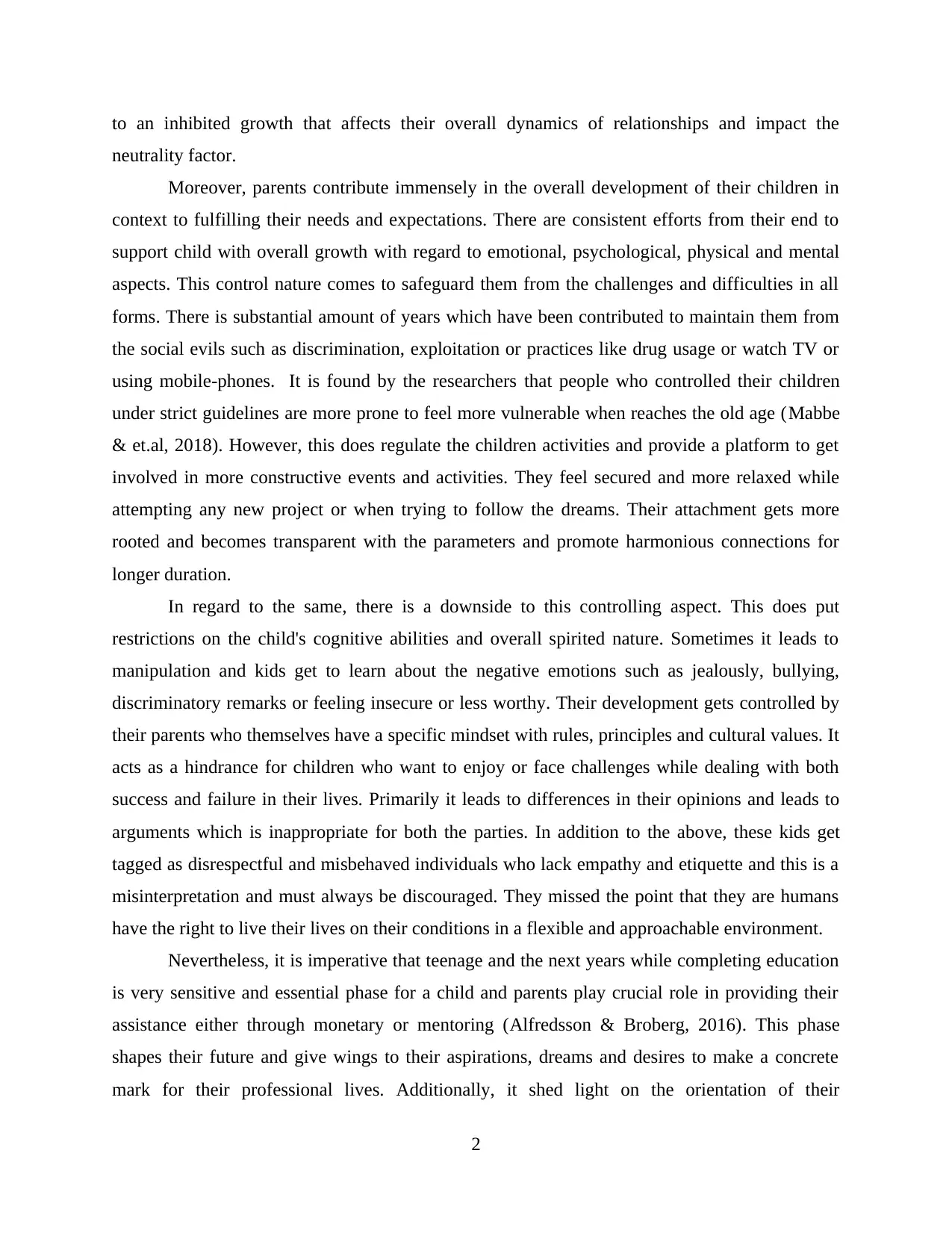
to an inhibited growth that affects their overall dynamics of relationships and impact the
neutrality factor.
Moreover, parents contribute immensely in the overall development of their children in
context to fulfilling their needs and expectations. There are consistent efforts from their end to
support child with overall growth with regard to emotional, psychological, physical and mental
aspects. This control nature comes to safeguard them from the challenges and difficulties in all
forms. There is substantial amount of years which have been contributed to maintain them from
the social evils such as discrimination, exploitation or practices like drug usage or watch TV or
using mobile-phones. It is found by the researchers that people who controlled their children
under strict guidelines are more prone to feel more vulnerable when reaches the old age (Mabbe
& et.al, 2018). However, this does regulate the children activities and provide a platform to get
involved in more constructive events and activities. They feel secured and more relaxed while
attempting any new project or when trying to follow the dreams. Their attachment gets more
rooted and becomes transparent with the parameters and promote harmonious connections for
longer duration.
In regard to the same, there is a downside to this controlling aspect. This does put
restrictions on the child's cognitive abilities and overall spirited nature. Sometimes it leads to
manipulation and kids get to learn about the negative emotions such as jealously, bullying,
discriminatory remarks or feeling insecure or less worthy. Their development gets controlled by
their parents who themselves have a specific mindset with rules, principles and cultural values. It
acts as a hindrance for children who want to enjoy or face challenges while dealing with both
success and failure in their lives. Primarily it leads to differences in their opinions and leads to
arguments which is inappropriate for both the parties. In addition to the above, these kids get
tagged as disrespectful and misbehaved individuals who lack empathy and etiquette and this is a
misinterpretation and must always be discouraged. They missed the point that they are humans
have the right to live their lives on their conditions in a flexible and approachable environment.
Nevertheless, it is imperative that teenage and the next years while completing education
is very sensitive and essential phase for a child and parents play crucial role in providing their
assistance either through monetary or mentoring (Alfredsson & Broberg, 2016). This phase
shapes their future and give wings to their aspirations, dreams and desires to make a concrete
mark for their professional lives. Additionally, it shed light on the orientation of their
2
neutrality factor.
Moreover, parents contribute immensely in the overall development of their children in
context to fulfilling their needs and expectations. There are consistent efforts from their end to
support child with overall growth with regard to emotional, psychological, physical and mental
aspects. This control nature comes to safeguard them from the challenges and difficulties in all
forms. There is substantial amount of years which have been contributed to maintain them from
the social evils such as discrimination, exploitation or practices like drug usage or watch TV or
using mobile-phones. It is found by the researchers that people who controlled their children
under strict guidelines are more prone to feel more vulnerable when reaches the old age (Mabbe
& et.al, 2018). However, this does regulate the children activities and provide a platform to get
involved in more constructive events and activities. They feel secured and more relaxed while
attempting any new project or when trying to follow the dreams. Their attachment gets more
rooted and becomes transparent with the parameters and promote harmonious connections for
longer duration.
In regard to the same, there is a downside to this controlling aspect. This does put
restrictions on the child's cognitive abilities and overall spirited nature. Sometimes it leads to
manipulation and kids get to learn about the negative emotions such as jealously, bullying,
discriminatory remarks or feeling insecure or less worthy. Their development gets controlled by
their parents who themselves have a specific mindset with rules, principles and cultural values. It
acts as a hindrance for children who want to enjoy or face challenges while dealing with both
success and failure in their lives. Primarily it leads to differences in their opinions and leads to
arguments which is inappropriate for both the parties. In addition to the above, these kids get
tagged as disrespectful and misbehaved individuals who lack empathy and etiquette and this is a
misinterpretation and must always be discouraged. They missed the point that they are humans
have the right to live their lives on their conditions in a flexible and approachable environment.
Nevertheless, it is imperative that teenage and the next years while completing education
is very sensitive and essential phase for a child and parents play crucial role in providing their
assistance either through monetary or mentoring (Alfredsson & Broberg, 2016). This phase
shapes their future and give wings to their aspirations, dreams and desires to make a concrete
mark for their professional lives. Additionally, it shed light on the orientation of their
2
Paraphrase This Document
Need a fresh take? Get an instant paraphrase of this document with our AI Paraphraser
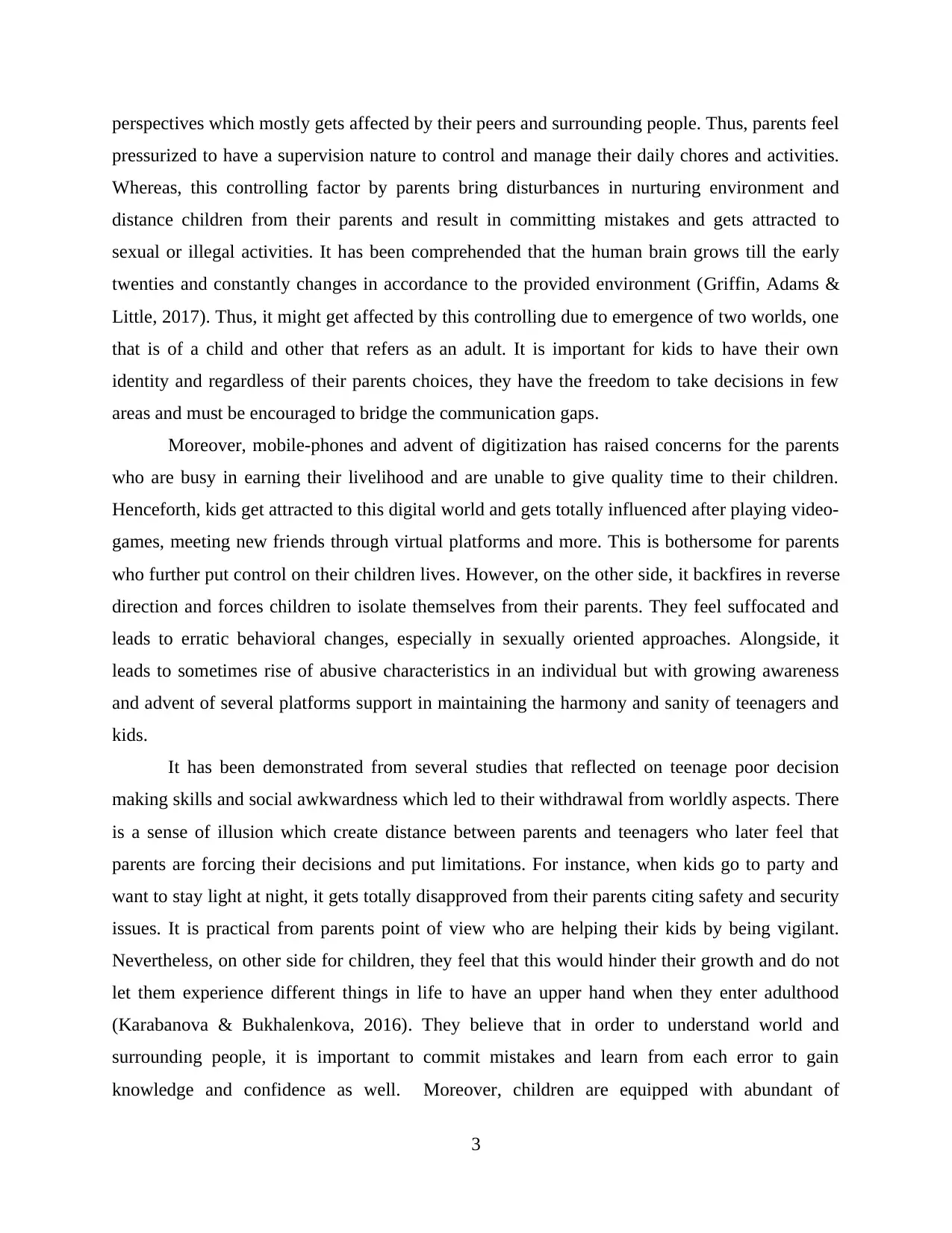
perspectives which mostly gets affected by their peers and surrounding people. Thus, parents feel
pressurized to have a supervision nature to control and manage their daily chores and activities.
Whereas, this controlling factor by parents bring disturbances in nurturing environment and
distance children from their parents and result in committing mistakes and gets attracted to
sexual or illegal activities. It has been comprehended that the human brain grows till the early
twenties and constantly changes in accordance to the provided environment (Griffin, Adams &
Little, 2017). Thus, it might get affected by this controlling due to emergence of two worlds, one
that is of a child and other that refers as an adult. It is important for kids to have their own
identity and regardless of their parents choices, they have the freedom to take decisions in few
areas and must be encouraged to bridge the communication gaps.
Moreover, mobile-phones and advent of digitization has raised concerns for the parents
who are busy in earning their livelihood and are unable to give quality time to their children.
Henceforth, kids get attracted to this digital world and gets totally influenced after playing video-
games, meeting new friends through virtual platforms and more. This is bothersome for parents
who further put control on their children lives. However, on the other side, it backfires in reverse
direction and forces children to isolate themselves from their parents. They feel suffocated and
leads to erratic behavioral changes, especially in sexually oriented approaches. Alongside, it
leads to sometimes rise of abusive characteristics in an individual but with growing awareness
and advent of several platforms support in maintaining the harmony and sanity of teenagers and
kids.
It has been demonstrated from several studies that reflected on teenage poor decision
making skills and social awkwardness which led to their withdrawal from worldly aspects. There
is a sense of illusion which create distance between parents and teenagers who later feel that
parents are forcing their decisions and put limitations. For instance, when kids go to party and
want to stay light at night, it gets totally disapproved from their parents citing safety and security
issues. It is practical from parents point of view who are helping their kids by being vigilant.
Nevertheless, on other side for children, they feel that this would hinder their growth and do not
let them experience different things in life to have an upper hand when they enter adulthood
(Karabanova & Bukhalenkova, 2016). They believe that in order to understand world and
surrounding people, it is important to commit mistakes and learn from each error to gain
knowledge and confidence as well. Moreover, children are equipped with abundant of
3
pressurized to have a supervision nature to control and manage their daily chores and activities.
Whereas, this controlling factor by parents bring disturbances in nurturing environment and
distance children from their parents and result in committing mistakes and gets attracted to
sexual or illegal activities. It has been comprehended that the human brain grows till the early
twenties and constantly changes in accordance to the provided environment (Griffin, Adams &
Little, 2017). Thus, it might get affected by this controlling due to emergence of two worlds, one
that is of a child and other that refers as an adult. It is important for kids to have their own
identity and regardless of their parents choices, they have the freedom to take decisions in few
areas and must be encouraged to bridge the communication gaps.
Moreover, mobile-phones and advent of digitization has raised concerns for the parents
who are busy in earning their livelihood and are unable to give quality time to their children.
Henceforth, kids get attracted to this digital world and gets totally influenced after playing video-
games, meeting new friends through virtual platforms and more. This is bothersome for parents
who further put control on their children lives. However, on the other side, it backfires in reverse
direction and forces children to isolate themselves from their parents. They feel suffocated and
leads to erratic behavioral changes, especially in sexually oriented approaches. Alongside, it
leads to sometimes rise of abusive characteristics in an individual but with growing awareness
and advent of several platforms support in maintaining the harmony and sanity of teenagers and
kids.
It has been demonstrated from several studies that reflected on teenage poor decision
making skills and social awkwardness which led to their withdrawal from worldly aspects. There
is a sense of illusion which create distance between parents and teenagers who later feel that
parents are forcing their decisions and put limitations. For instance, when kids go to party and
want to stay light at night, it gets totally disapproved from their parents citing safety and security
issues. It is practical from parents point of view who are helping their kids by being vigilant.
Nevertheless, on other side for children, they feel that this would hinder their growth and do not
let them experience different things in life to have an upper hand when they enter adulthood
(Karabanova & Bukhalenkova, 2016). They believe that in order to understand world and
surrounding people, it is important to commit mistakes and learn from each error to gain
knowledge and confidence as well. Moreover, children are equipped with abundant of
3
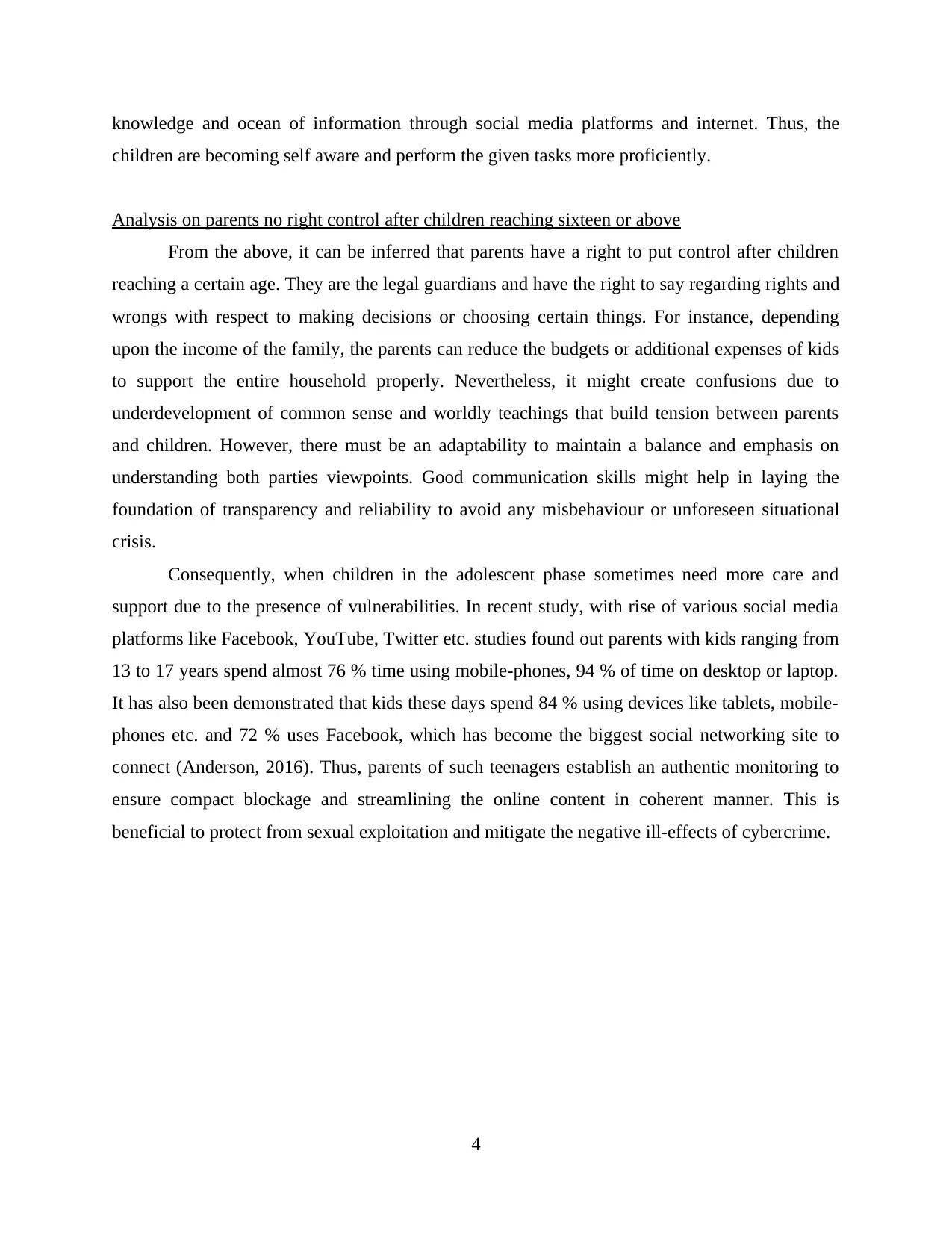
knowledge and ocean of information through social media platforms and internet. Thus, the
children are becoming self aware and perform the given tasks more proficiently.
Analysis on parents no right control after children reaching sixteen or above
From the above, it can be inferred that parents have a right to put control after children
reaching a certain age. They are the legal guardians and have the right to say regarding rights and
wrongs with respect to making decisions or choosing certain things. For instance, depending
upon the income of the family, the parents can reduce the budgets or additional expenses of kids
to support the entire household properly. Nevertheless, it might create confusions due to
underdevelopment of common sense and worldly teachings that build tension between parents
and children. However, there must be an adaptability to maintain a balance and emphasis on
understanding both parties viewpoints. Good communication skills might help in laying the
foundation of transparency and reliability to avoid any misbehaviour or unforeseen situational
crisis.
Consequently, when children in the adolescent phase sometimes need more care and
support due to the presence of vulnerabilities. In recent study, with rise of various social media
platforms like Facebook, YouTube, Twitter etc. studies found out parents with kids ranging from
13 to 17 years spend almost 76 % time using mobile-phones, 94 % of time on desktop or laptop.
It has also been demonstrated that kids these days spend 84 % using devices like tablets, mobile-
phones etc. and 72 % uses Facebook, which has become the biggest social networking site to
connect (Anderson, 2016). Thus, parents of such teenagers establish an authentic monitoring to
ensure compact blockage and streamlining the online content in coherent manner. This is
beneficial to protect from sexual exploitation and mitigate the negative ill-effects of cybercrime.
4
children are becoming self aware and perform the given tasks more proficiently.
Analysis on parents no right control after children reaching sixteen or above
From the above, it can be inferred that parents have a right to put control after children
reaching a certain age. They are the legal guardians and have the right to say regarding rights and
wrongs with respect to making decisions or choosing certain things. For instance, depending
upon the income of the family, the parents can reduce the budgets or additional expenses of kids
to support the entire household properly. Nevertheless, it might create confusions due to
underdevelopment of common sense and worldly teachings that build tension between parents
and children. However, there must be an adaptability to maintain a balance and emphasis on
understanding both parties viewpoints. Good communication skills might help in laying the
foundation of transparency and reliability to avoid any misbehaviour or unforeseen situational
crisis.
Consequently, when children in the adolescent phase sometimes need more care and
support due to the presence of vulnerabilities. In recent study, with rise of various social media
platforms like Facebook, YouTube, Twitter etc. studies found out parents with kids ranging from
13 to 17 years spend almost 76 % time using mobile-phones, 94 % of time on desktop or laptop.
It has also been demonstrated that kids these days spend 84 % using devices like tablets, mobile-
phones etc. and 72 % uses Facebook, which has become the biggest social networking site to
connect (Anderson, 2016). Thus, parents of such teenagers establish an authentic monitoring to
ensure compact blockage and streamlining the online content in coherent manner. This is
beneficial to protect from sexual exploitation and mitigate the negative ill-effects of cybercrime.
4
⊘ This is a preview!⊘
Do you want full access?
Subscribe today to unlock all pages.

Trusted by 1+ million students worldwide
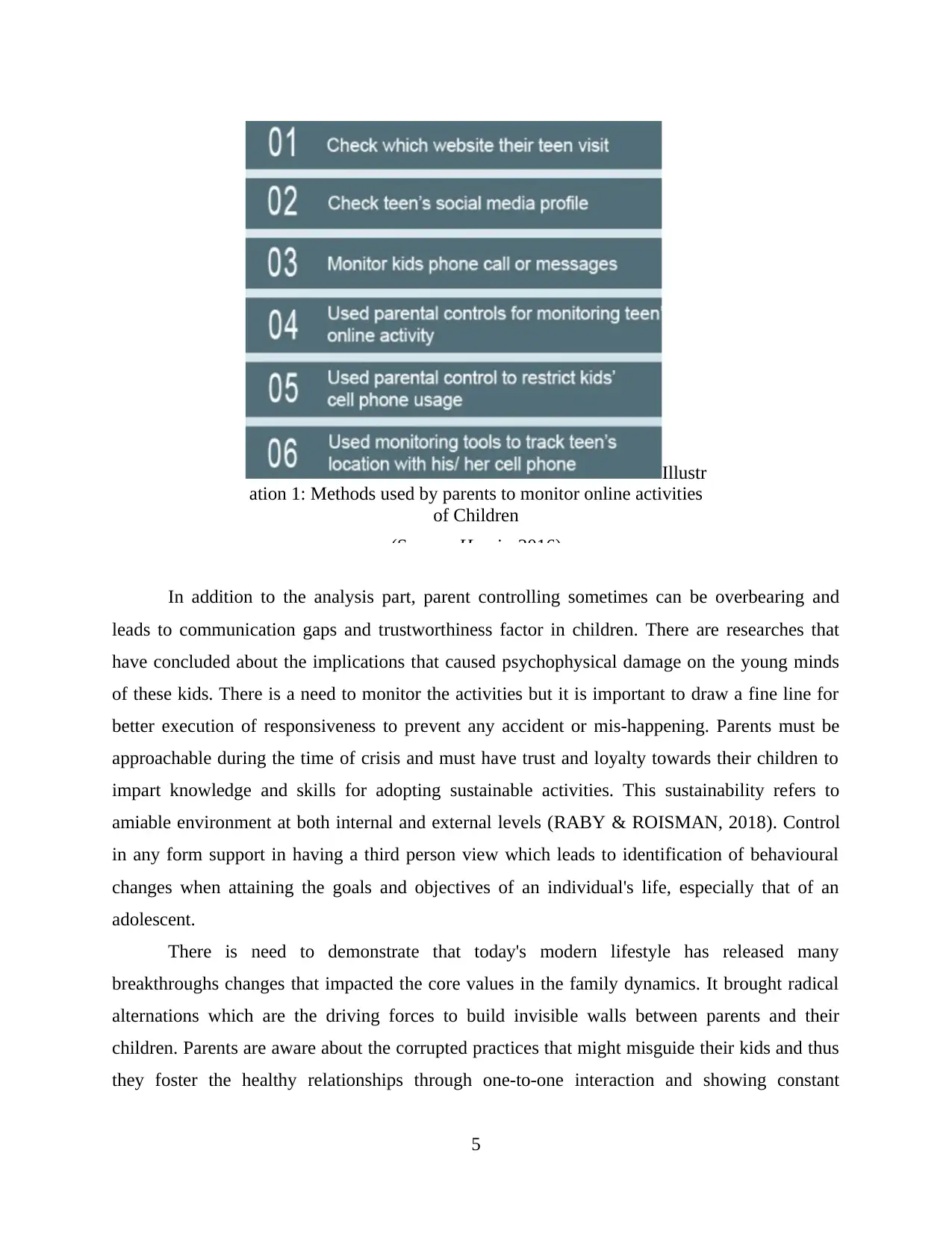
In addition to the analysis part, parent controlling sometimes can be overbearing and
leads to communication gaps and trustworthiness factor in children. There are researches that
have concluded about the implications that caused psychophysical damage on the young minds
of these kids. There is a need to monitor the activities but it is important to draw a fine line for
better execution of responsiveness to prevent any accident or mis-happening. Parents must be
approachable during the time of crisis and must have trust and loyalty towards their children to
impart knowledge and skills for adopting sustainable activities. This sustainability refers to
amiable environment at both internal and external levels (RABY & ROISMAN, 2018). Control
in any form support in having a third person view which leads to identification of behavioural
changes when attaining the goals and objectives of an individual's life, especially that of an
adolescent.
There is need to demonstrate that today's modern lifestyle has released many
breakthroughs changes that impacted the core values in the family dynamics. It brought radical
alternations which are the driving forces to build invisible walls between parents and their
children. Parents are aware about the corrupted practices that might misguide their kids and thus
they foster the healthy relationships through one-to-one interaction and showing constant
5
Illustr
ation 1: Methods used by parents to monitor online activities
of Children
(Source: Harris, 2016)
leads to communication gaps and trustworthiness factor in children. There are researches that
have concluded about the implications that caused psychophysical damage on the young minds
of these kids. There is a need to monitor the activities but it is important to draw a fine line for
better execution of responsiveness to prevent any accident or mis-happening. Parents must be
approachable during the time of crisis and must have trust and loyalty towards their children to
impart knowledge and skills for adopting sustainable activities. This sustainability refers to
amiable environment at both internal and external levels (RABY & ROISMAN, 2018). Control
in any form support in having a third person view which leads to identification of behavioural
changes when attaining the goals and objectives of an individual's life, especially that of an
adolescent.
There is need to demonstrate that today's modern lifestyle has released many
breakthroughs changes that impacted the core values in the family dynamics. It brought radical
alternations which are the driving forces to build invisible walls between parents and their
children. Parents are aware about the corrupted practices that might misguide their kids and thus
they foster the healthy relationships through one-to-one interaction and showing constant
5
Illustr
ation 1: Methods used by parents to monitor online activities
of Children
(Source: Harris, 2016)
Paraphrase This Document
Need a fresh take? Get an instant paraphrase of this document with our AI Paraphraser
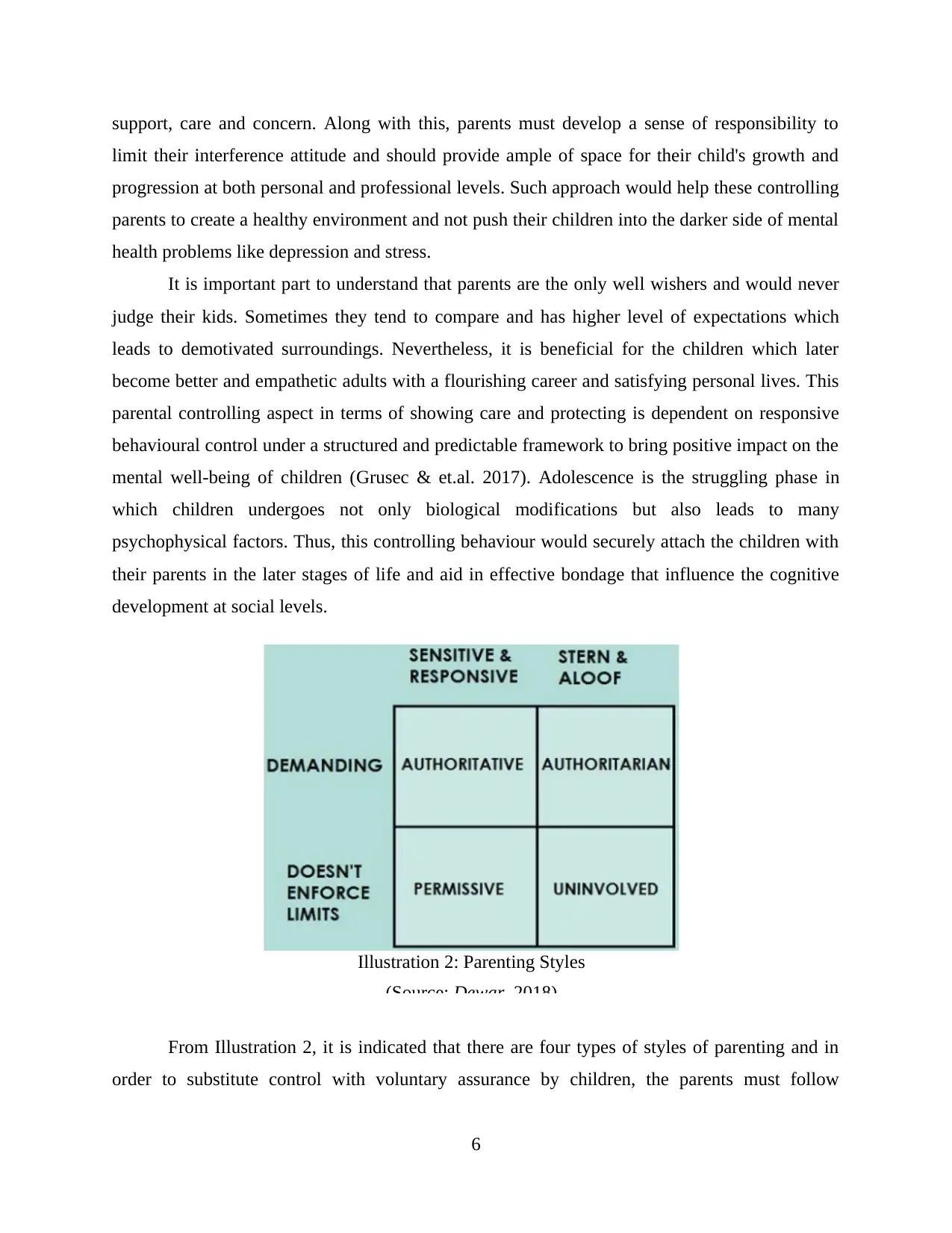
support, care and concern. Along with this, parents must develop a sense of responsibility to
limit their interference attitude and should provide ample of space for their child's growth and
progression at both personal and professional levels. Such approach would help these controlling
parents to create a healthy environment and not push their children into the darker side of mental
health problems like depression and stress.
It is important part to understand that parents are the only well wishers and would never
judge their kids. Sometimes they tend to compare and has higher level of expectations which
leads to demotivated surroundings. Nevertheless, it is beneficial for the children which later
become better and empathetic adults with a flourishing career and satisfying personal lives. This
parental controlling aspect in terms of showing care and protecting is dependent on responsive
behavioural control under a structured and predictable framework to bring positive impact on the
mental well-being of children (Grusec & et.al. 2017). Adolescence is the struggling phase in
which children undergoes not only biological modifications but also leads to many
psychophysical factors. Thus, this controlling behaviour would securely attach the children with
their parents in the later stages of life and aid in effective bondage that influence the cognitive
development at social levels.
From Illustration 2, it is indicated that there are four types of styles of parenting and in
order to substitute control with voluntary assurance by children, the parents must follow
6
Illustration 2: Parenting Styles
(Source: Dewar, 2018)
limit their interference attitude and should provide ample of space for their child's growth and
progression at both personal and professional levels. Such approach would help these controlling
parents to create a healthy environment and not push their children into the darker side of mental
health problems like depression and stress.
It is important part to understand that parents are the only well wishers and would never
judge their kids. Sometimes they tend to compare and has higher level of expectations which
leads to demotivated surroundings. Nevertheless, it is beneficial for the children which later
become better and empathetic adults with a flourishing career and satisfying personal lives. This
parental controlling aspect in terms of showing care and protecting is dependent on responsive
behavioural control under a structured and predictable framework to bring positive impact on the
mental well-being of children (Grusec & et.al. 2017). Adolescence is the struggling phase in
which children undergoes not only biological modifications but also leads to many
psychophysical factors. Thus, this controlling behaviour would securely attach the children with
their parents in the later stages of life and aid in effective bondage that influence the cognitive
development at social levels.
From Illustration 2, it is indicated that there are four types of styles of parenting and in
order to substitute control with voluntary assurance by children, the parents must follow
6
Illustration 2: Parenting Styles
(Source: Dewar, 2018)
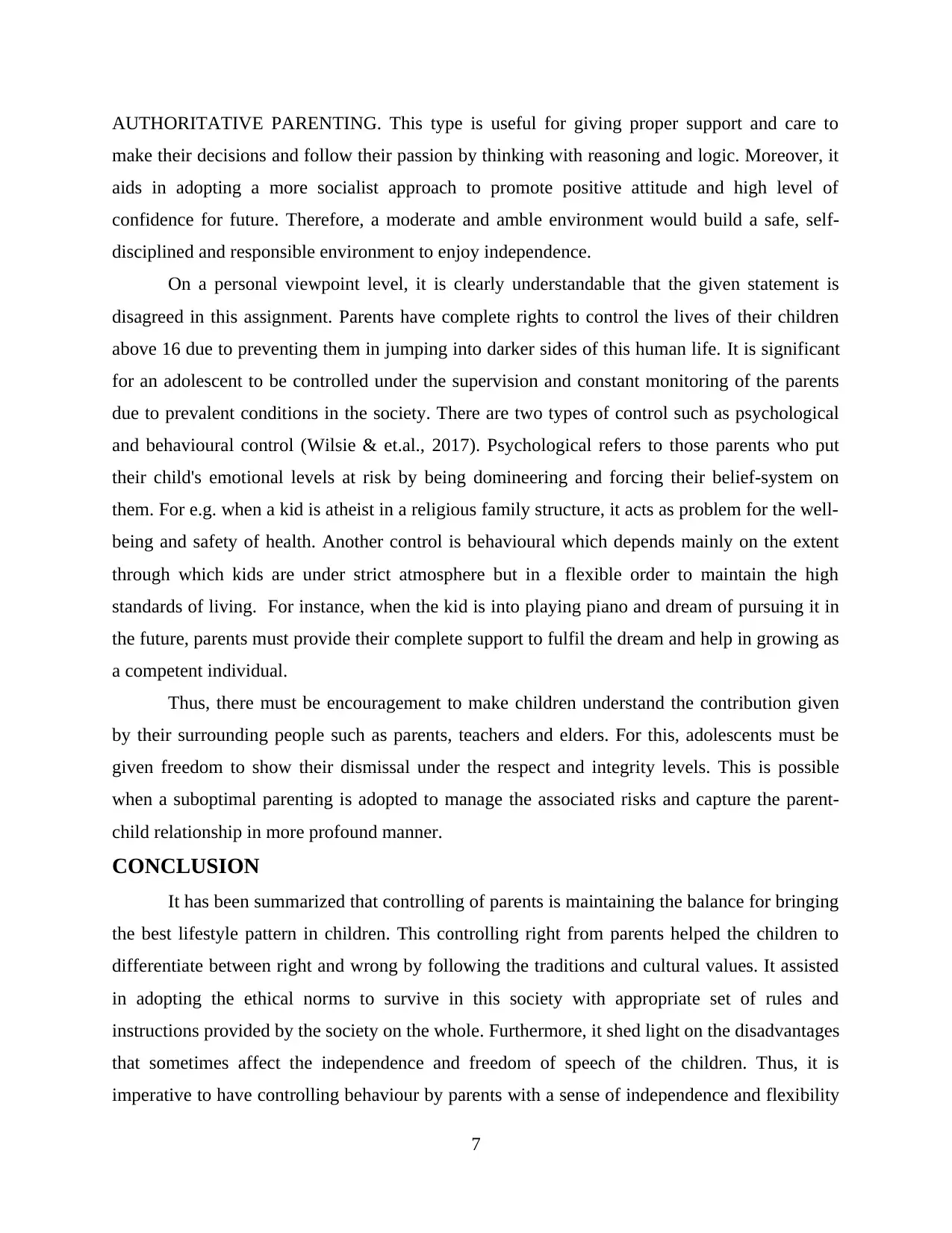
AUTHORITATIVE PARENTING. This type is useful for giving proper support and care to
make their decisions and follow their passion by thinking with reasoning and logic. Moreover, it
aids in adopting a more socialist approach to promote positive attitude and high level of
confidence for future. Therefore, a moderate and amble environment would build a safe, self-
disciplined and responsible environment to enjoy independence.
On a personal viewpoint level, it is clearly understandable that the given statement is
disagreed in this assignment. Parents have complete rights to control the lives of their children
above 16 due to preventing them in jumping into darker sides of this human life. It is significant
for an adolescent to be controlled under the supervision and constant monitoring of the parents
due to prevalent conditions in the society. There are two types of control such as psychological
and behavioural control (Wilsie & et.al., 2017). Psychological refers to those parents who put
their child's emotional levels at risk by being domineering and forcing their belief-system on
them. For e.g. when a kid is atheist in a religious family structure, it acts as problem for the well-
being and safety of health. Another control is behavioural which depends mainly on the extent
through which kids are under strict atmosphere but in a flexible order to maintain the high
standards of living. For instance, when the kid is into playing piano and dream of pursuing it in
the future, parents must provide their complete support to fulfil the dream and help in growing as
a competent individual.
Thus, there must be encouragement to make children understand the contribution given
by their surrounding people such as parents, teachers and elders. For this, adolescents must be
given freedom to show their dismissal under the respect and integrity levels. This is possible
when a suboptimal parenting is adopted to manage the associated risks and capture the parent-
child relationship in more profound manner.
CONCLUSION
It has been summarized that controlling of parents is maintaining the balance for bringing
the best lifestyle pattern in children. This controlling right from parents helped the children to
differentiate between right and wrong by following the traditions and cultural values. It assisted
in adopting the ethical norms to survive in this society with appropriate set of rules and
instructions provided by the society on the whole. Furthermore, it shed light on the disadvantages
that sometimes affect the independence and freedom of speech of the children. Thus, it is
imperative to have controlling behaviour by parents with a sense of independence and flexibility
7
make their decisions and follow their passion by thinking with reasoning and logic. Moreover, it
aids in adopting a more socialist approach to promote positive attitude and high level of
confidence for future. Therefore, a moderate and amble environment would build a safe, self-
disciplined and responsible environment to enjoy independence.
On a personal viewpoint level, it is clearly understandable that the given statement is
disagreed in this assignment. Parents have complete rights to control the lives of their children
above 16 due to preventing them in jumping into darker sides of this human life. It is significant
for an adolescent to be controlled under the supervision and constant monitoring of the parents
due to prevalent conditions in the society. There are two types of control such as psychological
and behavioural control (Wilsie & et.al., 2017). Psychological refers to those parents who put
their child's emotional levels at risk by being domineering and forcing their belief-system on
them. For e.g. when a kid is atheist in a religious family structure, it acts as problem for the well-
being and safety of health. Another control is behavioural which depends mainly on the extent
through which kids are under strict atmosphere but in a flexible order to maintain the high
standards of living. For instance, when the kid is into playing piano and dream of pursuing it in
the future, parents must provide their complete support to fulfil the dream and help in growing as
a competent individual.
Thus, there must be encouragement to make children understand the contribution given
by their surrounding people such as parents, teachers and elders. For this, adolescents must be
given freedom to show their dismissal under the respect and integrity levels. This is possible
when a suboptimal parenting is adopted to manage the associated risks and capture the parent-
child relationship in more profound manner.
CONCLUSION
It has been summarized that controlling of parents is maintaining the balance for bringing
the best lifestyle pattern in children. This controlling right from parents helped the children to
differentiate between right and wrong by following the traditions and cultural values. It assisted
in adopting the ethical norms to survive in this society with appropriate set of rules and
instructions provided by the society on the whole. Furthermore, it shed light on the disadvantages
that sometimes affect the independence and freedom of speech of the children. Thus, it is
imperative to have controlling behaviour by parents with a sense of independence and flexibility
7
⊘ This is a preview!⊘
Do you want full access?
Subscribe today to unlock all pages.

Trusted by 1+ million students worldwide
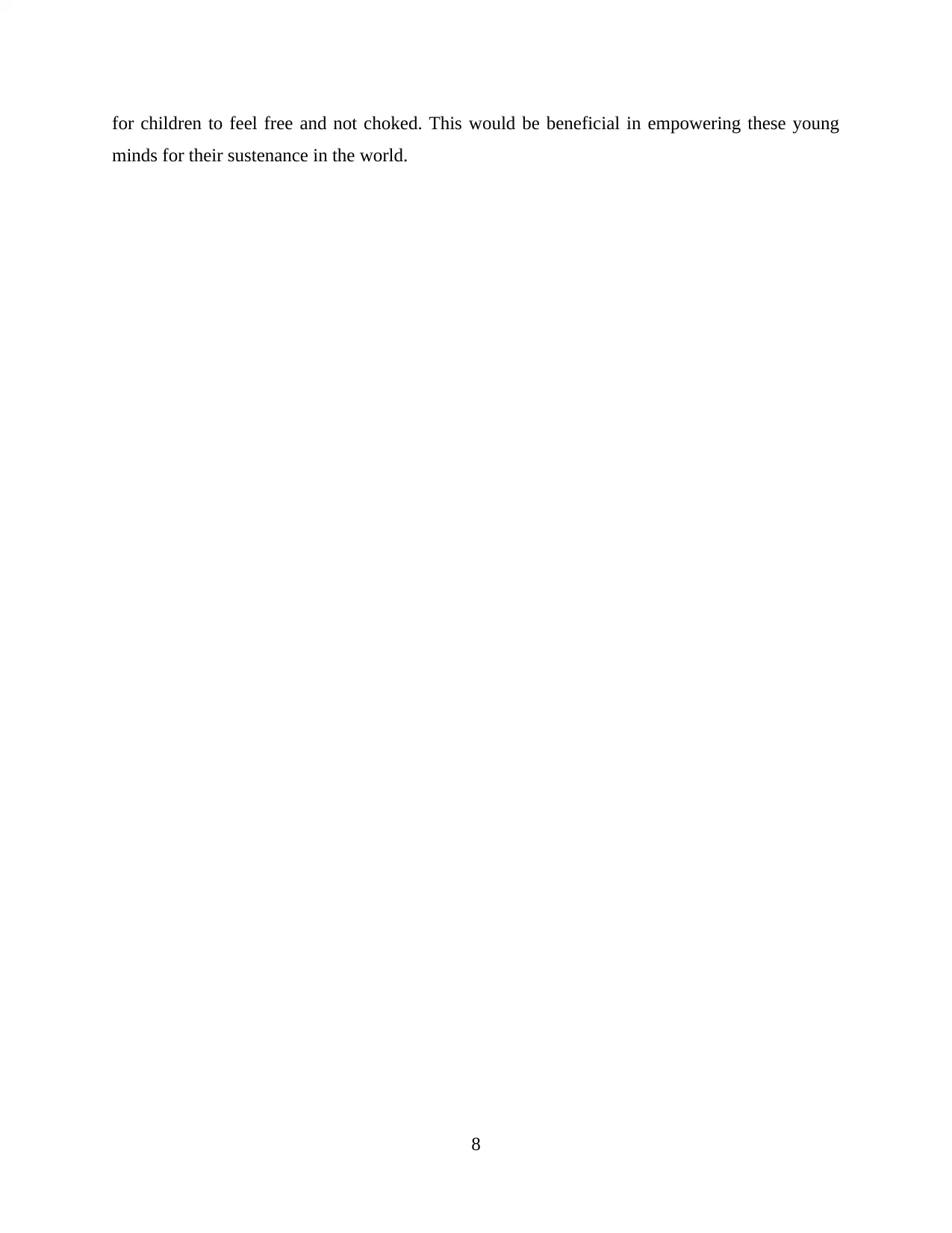
for children to feel free and not choked. This would be beneficial in empowering these young
minds for their sustenance in the world.
8
minds for their sustenance in the world.
8
Paraphrase This Document
Need a fresh take? Get an instant paraphrase of this document with our AI Paraphraser
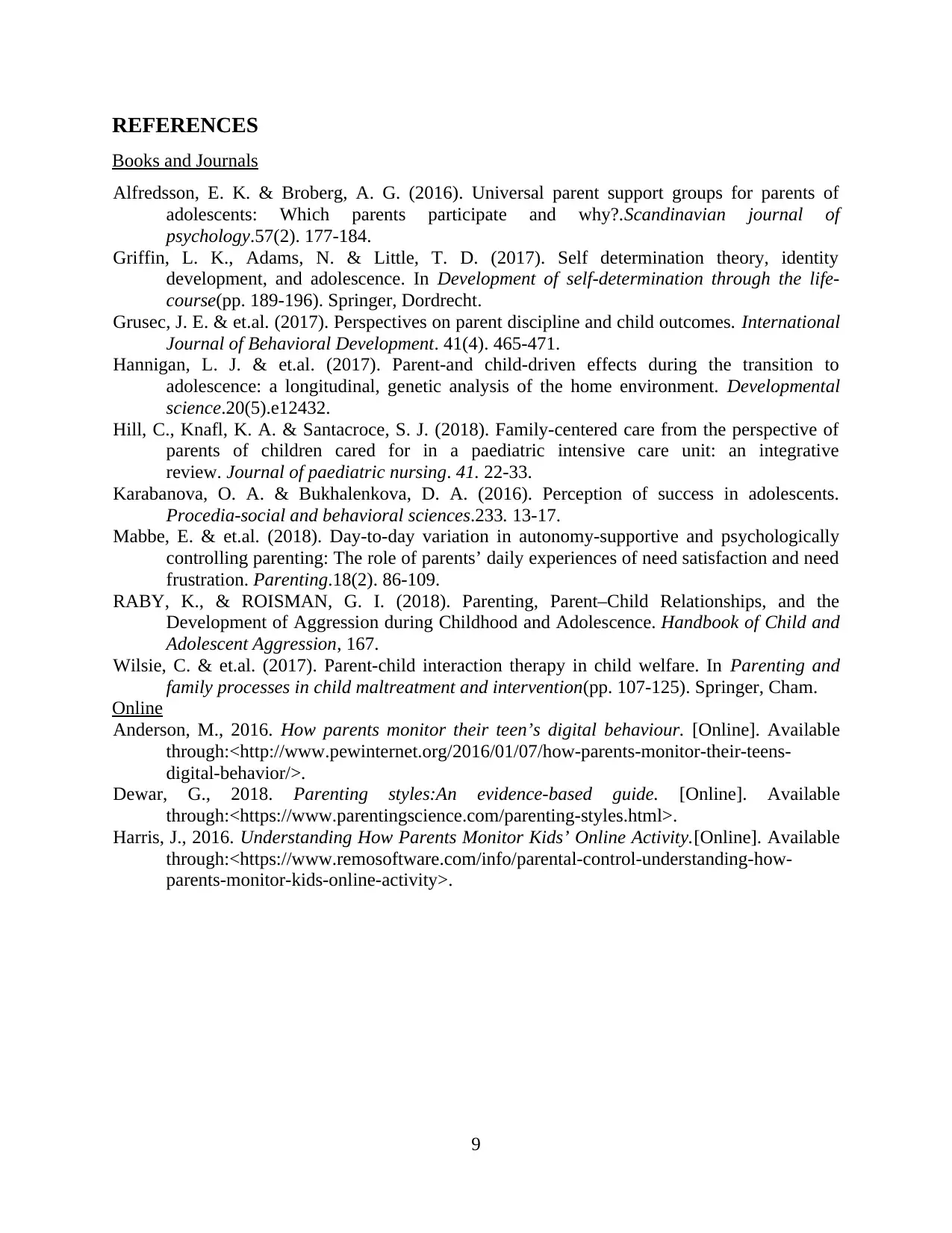
REFERENCES
Books and Journals
Alfredsson, E. K. & Broberg, A. G. (2016). Universal parent support groups for parents of
adolescents: Which parents participate and why?.Scandinavian journal of
psychology.57(2). 177-184.
Griffin, L. K., Adams, N. & Little, T. D. (2017). Self determination theory, identity
development, and adolescence. In Development of self-determination through the life-
course(pp. 189-196). Springer, Dordrecht.
Grusec, J. E. & et.al. (2017). Perspectives on parent discipline and child outcomes. International
Journal of Behavioral Development. 41(4). 465-471.
Hannigan, L. J. & et.al. (2017). Parent‐and child‐driven effects during the transition to
adolescence: a longitudinal, genetic analysis of the home environment. Developmental
science.20(5).e12432.
Hill, C., Knafl, K. A. & Santacroce, S. J. (2018). Family-centered care from the perspective of
parents of children cared for in a paediatric intensive care unit: an integrative
review. Journal of paediatric nursing. 41. 22-33.
Karabanova, O. A. & Bukhalenkova, D. A. (2016). Perception of success in adolescents.
Procedia-social and behavioral sciences.233. 13-17.
Mabbe, E. & et.al. (2018). Day-to-day variation in autonomy-supportive and psychologically
controlling parenting: The role of parents’ daily experiences of need satisfaction and need
frustration. Parenting.18(2). 86-109.
RABY, K., & ROISMAN, G. I. (2018). Parenting, Parent–Child Relationships, and the
Development of Aggression during Childhood and Adolescence. Handbook of Child and
Adolescent Aggression, 167.
Wilsie, C. & et.al. (2017). Parent-child interaction therapy in child welfare. In Parenting and
family processes in child maltreatment and intervention(pp. 107-125). Springer, Cham.
Online
Anderson, M., 2016. How parents monitor their teen’s digital behaviour. [Online]. Available
through:<http://www.pewinternet.org/2016/01/07/how-parents-monitor-their-teens-
digital-behavior/>.
Dewar, G., 2018. Parenting styles:An evidence-based guide. [Online]. Available
through:<https://www.parentingscience.com/parenting-styles.html>.
Harris, J., 2016. Understanding How Parents Monitor Kids’ Online Activity.[Online]. Available
through:<https://www.remosoftware.com/info/parental-control-understanding-how-
parents-monitor-kids-online-activity>.
9
Books and Journals
Alfredsson, E. K. & Broberg, A. G. (2016). Universal parent support groups for parents of
adolescents: Which parents participate and why?.Scandinavian journal of
psychology.57(2). 177-184.
Griffin, L. K., Adams, N. & Little, T. D. (2017). Self determination theory, identity
development, and adolescence. In Development of self-determination through the life-
course(pp. 189-196). Springer, Dordrecht.
Grusec, J. E. & et.al. (2017). Perspectives on parent discipline and child outcomes. International
Journal of Behavioral Development. 41(4). 465-471.
Hannigan, L. J. & et.al. (2017). Parent‐and child‐driven effects during the transition to
adolescence: a longitudinal, genetic analysis of the home environment. Developmental
science.20(5).e12432.
Hill, C., Knafl, K. A. & Santacroce, S. J. (2018). Family-centered care from the perspective of
parents of children cared for in a paediatric intensive care unit: an integrative
review. Journal of paediatric nursing. 41. 22-33.
Karabanova, O. A. & Bukhalenkova, D. A. (2016). Perception of success in adolescents.
Procedia-social and behavioral sciences.233. 13-17.
Mabbe, E. & et.al. (2018). Day-to-day variation in autonomy-supportive and psychologically
controlling parenting: The role of parents’ daily experiences of need satisfaction and need
frustration. Parenting.18(2). 86-109.
RABY, K., & ROISMAN, G. I. (2018). Parenting, Parent–Child Relationships, and the
Development of Aggression during Childhood and Adolescence. Handbook of Child and
Adolescent Aggression, 167.
Wilsie, C. & et.al. (2017). Parent-child interaction therapy in child welfare. In Parenting and
family processes in child maltreatment and intervention(pp. 107-125). Springer, Cham.
Online
Anderson, M., 2016. How parents monitor their teen’s digital behaviour. [Online]. Available
through:<http://www.pewinternet.org/2016/01/07/how-parents-monitor-their-teens-
digital-behavior/>.
Dewar, G., 2018. Parenting styles:An evidence-based guide. [Online]. Available
through:<https://www.parentingscience.com/parenting-styles.html>.
Harris, J., 2016. Understanding How Parents Monitor Kids’ Online Activity.[Online]. Available
through:<https://www.remosoftware.com/info/parental-control-understanding-how-
parents-monitor-kids-online-activity>.
9
1 out of 11
Related Documents
Your All-in-One AI-Powered Toolkit for Academic Success.
+13062052269
info@desklib.com
Available 24*7 on WhatsApp / Email
![[object Object]](/_next/static/media/star-bottom.7253800d.svg)
Unlock your academic potential
Copyright © 2020–2025 A2Z Services. All Rights Reserved. Developed and managed by ZUCOL.





